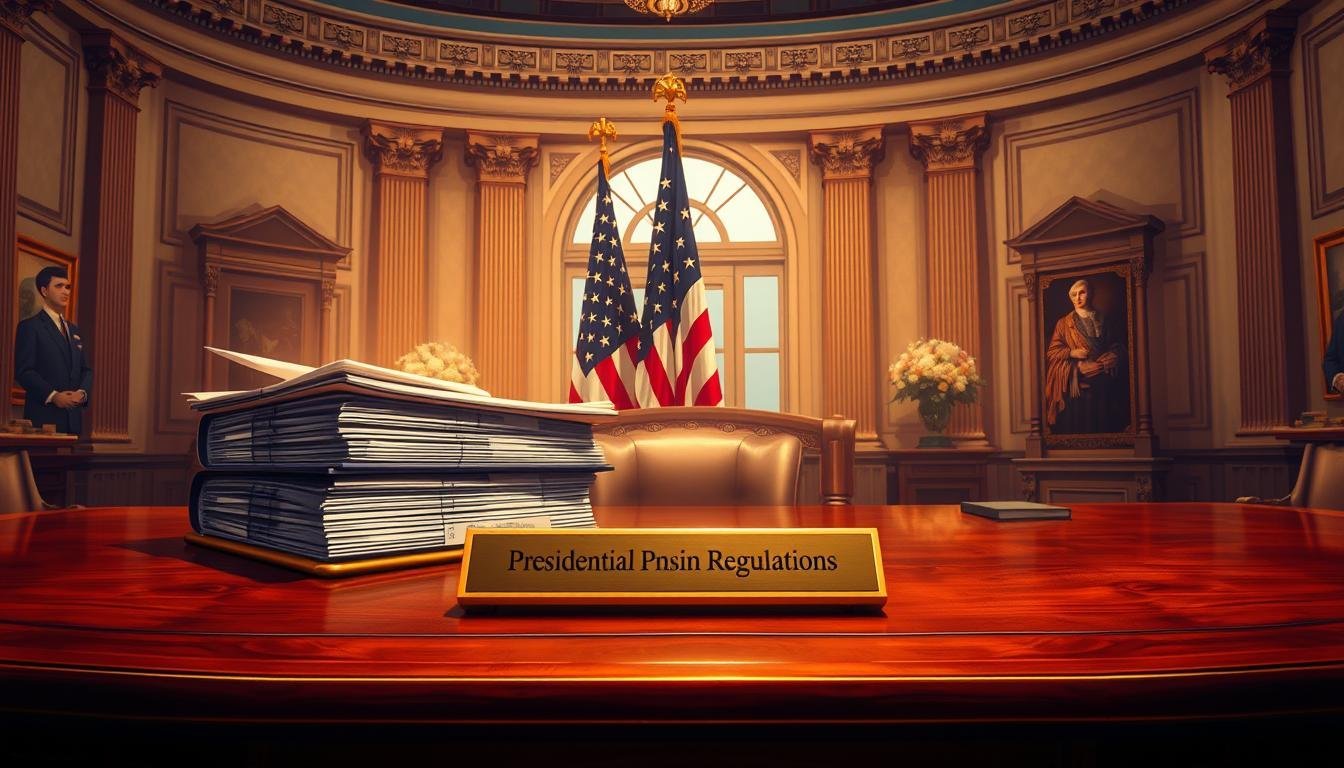Does the President Get a Pension? Ever wondered what happens to former US Presidents after they leave the White House? They get a presidential pension. This pension helps them live comfortably after their time in office.
But the pension is just part of what they get. The benefits package is designed to support them in their post-presidency life. It’s a way to thank them for their service and dedication to the country.
Learning about these benefits can give you a peek into the lives of former Presidents. It shows the privileges they enjoy after leaving office.
Contents
- 1 Presidential Pension Overview
- 2 Does the President Get a Pension? Understanding the Benefits
- 3 History of Presidential Pensions
- 4 Additional Benefits Beyond the Pension
- 5 Eligibility Requirements and Controversies
- 6 Understanding the Presidential Pension System
- 7 FAQ: Does the President Get a Pension?
- 7.1 How much pension do former US Presidents receive?
- 7.2 Are presidential pensions taxable?
- 7.3 What other benefits do former Presidents receive besides their pension?
- 7.4 How long do former Presidents receive their pension?
- 7.5 Can former Presidents earn outside income while receiving their pension?
- 7.6 Have there been any controversies surrounding presidential pensions?
- 7.7 How has the presidential pension system evolved over time?
- 7.8 Do former Presidents receive other forms of support besides their pension and benefits?
Presidential Pension Overview
Ever wondered what happens to US Presidents after they leave office? The presidential pension system is there to ensure they have financial security and benefits.
The White House pension, also known as the Presidential Pension, is a lifetime gift to former US Presidents. It grows with inflation each year, keeping up with the cost of living.
Former Presidents get a pension that matches a Cabinet member’s salary, now at $219,200 a year. They also get help with office costs, travel, and staff support.
But it’s not just about the money. They also get medical care and security, among other perks. This shows how well former Presidents are taken care of.
The pension system is a big part of what happens after a President leaves office. It offers financial stability and many benefits. As you learn more, you’ll see how these benefits work and their importance.
Does the President Get a Pension? Understanding the Benefits
After being President, people get many benefits. These rewards show thanks for their service. They help support their life after leaving office.
Financial Benefits and Support Services
Former US Presidents get a pension. It’s the same as a Cabinet member’s salary, about $219,200 a year. This money helps with living costs and other financial needs.
They also get support services. For example, Secret Service protection is given for life. This keeps them safe and secure.
Other perks include office space and staff help. They can keep working. They also get medical care at military hospitals. This is great for their health.
- Pension equal to a Cabinet member’s salary
- Lifetime Secret Service protection
- Office space and staff funding
- Access to medical care at military hospitals
These benefits make a strong support system for former Presidents. They show respect for their work and care for their well-being.
History of Presidential Pensions
Did you know how presidential pensions have changed over time? The first one started in 1958. Congress passed the Former Presidents Act, giving a lifetime pension to former presidents.
This big change started a new era for presidential retirement benefits. Since then, the system has seen many updates. These changes aimed to adjust the pension amount and who gets it.
- The first pension was $25,000 a year, a lot back then.
- Years later, the amount changed to keep up with inflation and living costs.
- Former presidents also get other benefits like office expenses, travel, and medical care.
The changes in presidential pensions show how needs and society have evolved. It’s clear that the history of these pensions is linked to presidential retirement. This ensures former presidents are cared for after they leave office.
Additional Benefits Beyond the Pension
Former Presidents get more than just a pension. They have a full support package. This includes many perks for their life after office.

One big benefit is lifelong security protection. They and their spouses get Secret Service protection. This keeps them safe all the time.
They also get travel allowances. This helps pay for their travel. It’s great for going to public events, diplomatic work, or just for fun.
Administrative support is another key part. They get office space and staff. This lets them stay in touch with their successors and keep contributing to public life.
These benefits help former Presidents live well after office. The US government gives them security, travel help, and office support. This way, they can keep their dignity and stay involved in public life.
Eligibility Requirements and Controversies
Ever wondered who gets a presidential pension and why there’s debate about it? The rules for getting a presidential pension are clear. Knowing these rules helps us understand the big picture of these benefits.
To get a presidential pension, you must have been the President of the United States. The pension is not means-tested, so your income or wealth doesn’t matter. The pension is set to match the salary of a current cabinet member, which is a big deal.
But, there’s a lot of debate about presidential pensions. Some say they’re too generous, especially since many former Presidents also get other big benefits. The main issues include:
- Questions about fairness, given the power and wealth former Presidents likely have.
- Concerns about the cost to taxpayers, as the government funds these benefits.
- Worries about setting a precedent for other public servants.
But, others think these benefits are needed. They help former Presidents keep the office’s dignity and support good causes. They also say the costs are tiny compared to the federal budget.
In short, getting a presidential pension is simple. But the debates show how complex it is to support former leaders financially.
Understanding the Presidential Pension System
You now know about the presidential pension system and its benefits. It’s a key part of what former US Presidents get after leaving office. It helps them financially.
Former Presidents get a lifetime pension of $219,200 a year. They also get office space, staff, and help with travel costs.
These perks help former Presidents keep serving the nation. Knowing about the presidential pension system gives us a peek into their lives.
See Also: What Was Theodore Roosevelt’s Position on Labor Issues?
FAQ: Does the President Get a Pension?
How much pension do former US Presidents receive?
Former US Presidents get a pension that matches the salary of a Cabinet member. This is about 9,200 each year.
Are presidential pensions taxable?
Yes, presidential pensions are seen as taxable income. They must be reported and taxed at the federal level.
What other benefits do former Presidents receive besides their pension?
Besides their pension, former Presidents get many other perks. These include security, travel funds, and help with administration.
How long do former Presidents receive their pension?
Former Presidents keep their pension for life. It starts right after they leave office.
Can former Presidents earn outside income while receiving their pension?
Yes, former Presidents can make money on their own while getting their pension. Many do this through books, speeches, and more.
Have there been any controversies surrounding presidential pensions?
Yes, there have been debates about presidential pensions. Some think they’re too big or unfair to some individuals.
How has the presidential pension system evolved over time?
The system for presidential pensions has changed a lot since it started. There have been updates to the amount, who gets it, and what else is included.
Do former Presidents receive other forms of support besides their pension and benefits?
Yes, former Presidents also get help from their libraries and foundations. They also get support from other groups and people.

Hi, I am Tatum Bradford from Washington. I have a background in political science and work as a senior revenue officer. I love learning about U.S. presidents and sharing interesting facts about political history.

